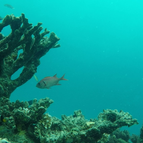1:00 BIODIVERSITY
Year Two Research is now COMPLETE!
We returned to the same coral heads a year later and recorded another hour of video. We documented every living thing we could that swam or scooted by to show how biodiversity levels are fluctuating from year to year. Take a look at the thirty second clips from each coral head, including a new location, below.
Additionally, the tables below show what we found this year compared to last!
If you want to join, put a hidden camera on your own reef...or river...or tundra...or anywhere. Let's start documenting our world's biodiversity together. Get in contact if you have a location you would like to carry out your own 1:00 biodiversity research project!










Toblar
Lorac
S.W.O.B.I.
Crown
What did we find?
2019
Species: 14
Organisms: 620
2019
Species: 12
Organisms: 239
2019
Species: 9
Organisms: 206
2020
Species: 27
Organisms: 454
2020
Species: 17
Organisms: 2500+
2020
Species: 19
Organisms: 122
2020
Species: 24
Organisms: 472
Click
The
Table
To
Down
Load

What is 1:00 Biodiversity?
This blog describes our project and what we did.

Why is Biodiversity Important?
Why should we be measuring levels of biodiversity and what can we learn from them over time?

What did we find?
What are the levels of biodiversity in the lagoon waters of the Marshall Islands?
HYDRA

How is Biodiversity Changing?
This was the first year for collecting data. What do we think we will see and hope to see in this area in the future?
SANTORINI

What impacts levels of biodiversity?
Why might we find more or less biodiversity in some places over time? That is what we will explore in this article.
MYKONOS

What can we learn?
This blog dives into the conclusions we make after our first year conducting this research.














